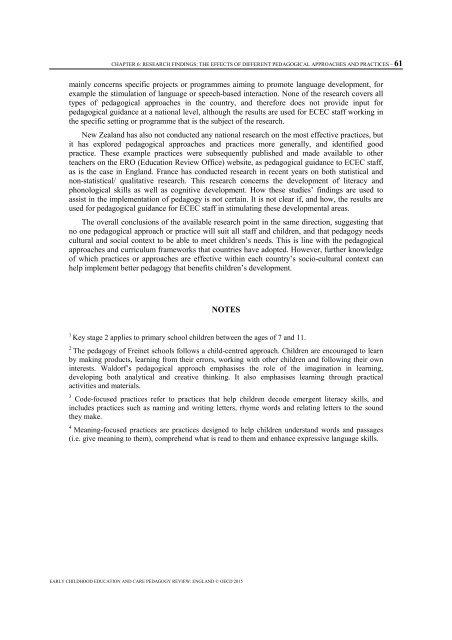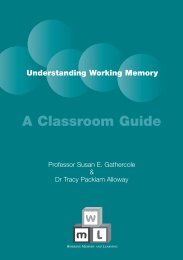60 – CHAPTER 6: RESEARCH FINDINGS: THE EFFECTS OF DIFFERENT PEDAGOGICAL APPROACHES AND PRACTICESTable 6.2. Effects of <strong>early</strong> <strong>education</strong> (academic) <strong>and</strong> comprehensive (child-centred) approachesWhich approach is most likely to improve a child’s... Academic/ Staff-initiated Comprehensive/Child-initiatedIQ scoresXMotivation to learnXLiteracy <strong>and</strong> numeracyXCreativityXIndependenceXSpecific knowledgeXSelf-confidenceXGeneral knowledgeXInitiativeXShort-term outcomesXLong-term outcomes X XSources: Barnett et al., 2010; Eurydice, 2009; Laevers, 2011; Schweinhart <strong>and</strong> Weikart, 1997.Research influencing pedagogical approaches <strong>and</strong> practicesResearch can impact <strong>pedagogy</strong> <strong>and</strong> pedagogical practices in the sense that research findingscan inform policy makers <strong>and</strong> practitioners on best practices <strong>and</strong> what works best in enhancingstaff performance, process quality <strong>and</strong> child development. This section addresses the research thathas been conducted on effective pedagogies, <strong>and</strong> how, as far as it can be ascertained, this hasaffected pedagogical approaches <strong>and</strong> practices.In a survey on <strong>pedagogy</strong> answered by 24 jurisdictions (OECD, 2014a), half respondedpositively that research had been conducted research on <strong>pedagogy</strong> <strong>and</strong> pedagogical approaches ingeneral. The other half reported that no research in this field had been carried out. While manycountries conduct research in ECEC, most focuses on the impacts of ECEC systems orprogrammes (ibid.). Of those that reported research on <strong>pedagogy</strong>, five indicated they conductedstatistical evaluations, alongside non-statistical/qualitative research <strong>and</strong> literature <strong>review</strong>s, whilethe research in the remaining countries is mostly qualitative <strong>and</strong>/or literature <strong>review</strong>s. Theresearch on <strong>pedagogy</strong> <strong>and</strong> practices are usually not conducted nation-wide but focus on particularprogrammes, <strong>and</strong> simply produce findings on specific approaches, regions or ECEC settings.Engl<strong>and</strong> has conducted non-statistical/qualitative research <strong>and</strong> literature <strong>review</strong>s in itsresearch on effective pedagogical practices. One of the best-known qualitative studies on theeffectiveness of <strong>pedagogy</strong> is the 2009 study “Research on Effective Pedagogy in the Early Years”(REPEY). REPEY qualitatively assessed two reception classes <strong>and</strong> 46 childminders, <strong>and</strong> analysedwhat effective practices are like. It found that effective <strong>pedagogy</strong> in the <strong>early</strong> years involves abalance of both the kind of interaction traditionally associated with the term “teaching”, <strong>and</strong> alsothe provision of instructive learning environments <strong>and</strong> routines. Furthermore, it found that the bestopportunities for adults to extend children’s thinking are often free-chosen play activities.“Excellent” <strong>and</strong> “good” ECEC settings tended to achieve an equal balance between adult-led <strong>and</strong>child-initiated interactions; the most effective settings also encouraged “sustained sharedthinking”. The REPEY study has been used to provide pedagogical guidance for ECEC staff inEngl<strong>and</strong>, which is one of the few countries that base pedagogical guidance for staff on practicesthat have been researched in the country itself.To return to the case-study countries, in Japan, pedagogical approaches are subject to research<strong>and</strong> surveys taken individually by local public organisations, universities <strong>and</strong> ECEC settings.Such studies are usually not conducted at national level, or collected <strong>and</strong> assessed in acomprehensive manner. Japanese research thus offers no conclusions about effective pedagogies<strong>and</strong> approaches at national level. This is also true of Denmark <strong>and</strong> Germany, both of whichindicated that they had conducted quantitative <strong>and</strong> qualitative studies on effective pedagogicalapproaches <strong>and</strong> practices. In Germany, recent research on effective pedagogical approachesEARLY CHILDHOOD EDUCATION AND CARE PEDAGOGY REVIEW: ENGLAND © OECD 2015
CHAPTER 6: RESEARCH FINDINGS: THE EFFECTS OF DIFFERENT PEDAGOGICAL APPROACHES AND PRACTICES – 61mainly concerns specific projects or programmes aiming to promote language development, forexample the stimulation of language or speech-based interaction. None of the research covers alltypes of pedagogical approaches in the country, <strong>and</strong> therefore does not provide input forpedagogical guidance at a national level, although the results are used for ECEC staff working inthe specific setting or programme that is the subject of the research.New Zeal<strong>and</strong> has also not conducted any national research on the most effective practices, butit has explored pedagogical approaches <strong>and</strong> practices more generally, <strong>and</strong> identified goodpractice. These example practices were subsequently published <strong>and</strong> made available to otherteachers on the ERO (Education Review Office) website, as pedagogical guidance to ECEC staff,as is the case in Engl<strong>and</strong>. France has conducted research in recent years on both statistical <strong>and</strong>non-statistical/ qualitative research. This research concerns the development of literacy <strong>and</strong>phonological skills as well as cognitive development. How these studies’ findings are used toassist in the implementation of <strong>pedagogy</strong> is not certain. It is not clear if, <strong>and</strong> how, the results areused for pedagogical guidance for ECEC staff in stimulating these developmental areas.The overall conclusions of the available research point in the same direction, suggesting thatno one pedagogical approach or practice will suit all staff <strong>and</strong> children, <strong>and</strong> that <strong>pedagogy</strong> needscultural <strong>and</strong> social context to be able to meet children’s needs. This is line with the pedagogicalapproaches <strong>and</strong> curriculum frameworks that countries have adopted. However, further knowledgeof which practices or approaches are effective within each country’s socio-cultural context canhelp implement better <strong>pedagogy</strong> that benefits children’s development.NOTES1Key stage 2 applies to primary school children between the ages of 7 <strong>and</strong> 11.2The <strong>pedagogy</strong> of Freinet schools follows a child-centred approach. Children are encouraged to learnby making products, learning from their errors, working with other children <strong>and</strong> following their owninterests. Waldorf’s pedagogical approach emphasises the role of the imagination in learning,developing both analytical <strong>and</strong> creative thinking. It also emphasises learning through practicalactivities <strong>and</strong> materials.3 Code-focused practices refer to practices that help children decode emergent literacy skills, <strong>and</strong>includes practices such as naming <strong>and</strong> writing letters, rhyme words <strong>and</strong> relating letters to the soundthey make.4Meaning-focused practices are practices designed to help children underst<strong>and</strong> words <strong>and</strong> passages(i.e. give meaning to them), comprehend what is read to them <strong>and</strong> enhance expressive language skills.EARLY CHILDHOOD EDUCATION AND CARE PEDAGOGY REVIEW: ENGLAND © OECD 2015



